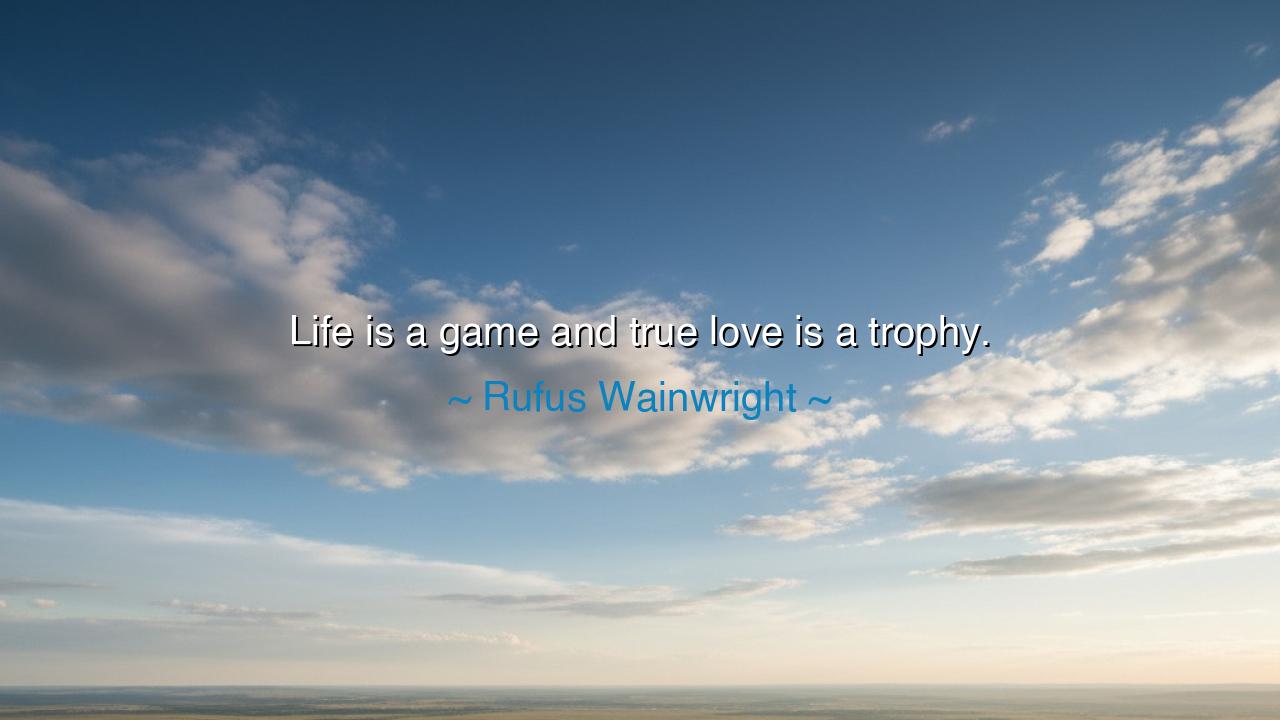
Life is a game and true love is a trophy.






Hear, O listener, the words of Rufus Wainwright, the poet of song and sorrow, who once declared: “Life is a game and true love is a trophy.” Though brief, these words carry the wisdom of both joy and struggle, for they speak of the great contest that is existence — the striving, the falling, the rising again — and of the one prize that outshines all others: love. Wainwright, whose art weaves pain with beauty, speaks not as one who mocks life’s seriousness, but as one who understands its nature. For life, like a game, demands courage, strategy, persistence, and grace — and love, when found, is the crown earned through all the trials of the heart.
To call life a game is not to dismiss its weight, but to reveal its pattern. In a game, there are rules and chaos, victories and defeats. Some are born with advantage, others with burden. Yet all must play — each making choices, taking risks, learning through failure. The game is not cruel, but it is demanding; it tests our patience, our faith, and our will to continue. And in this great arena, Wainwright reminds us, there is one reward worth all the striving: true love, the trophy not made of gold or glory, but of connection, understanding, and devotion. For in a world filled with fleeting triumphs, love alone endures beyond the final whistle of time.
Rufus Wainwright’s life itself gives meaning to his words. Born into a family of musicians, he walked the path of art — a game that offers both ecstasy and despair. He faced rejection, heartbreak, and the long shadow of self-doubt. Yet through all, he returned again and again to the theme of love — not as sentiment, but as salvation. His songs, woven with tenderness and melancholy, speak of the soul’s yearning to win something real in a world of illusion. When he speaks of love as the “trophy,” he honors not just romance, but the triumph of the heart that continues to hope even after loss.
The ancients would have understood this truth well. Consider Odysseus, the wanderer of Homer’s Odyssey, who endured storms, monsters, and temptation for twenty years before returning to his wife, Penelope. His journey was no mere adventure — it was the long, grueling game of life itself, testing his strength, wisdom, and loyalty. And what was his final reward? Not wealth, not power, but love — the reunion with the one heart that had remained faithful through all trials. Thus, even in myth, love stands as the true trophy of existence — the treasure found only through endurance, courage, and grace.
But Wainwright’s words carry a double meaning, for he also warns us of the illusion of victory. In the game of life, many chase the wrong trophies — wealth, fame, pleasure, dominion. They exhaust their days in pursuit of what glitters but does not fulfill. Yet, when all other prizes turn to dust, it is love that remains — the quiet, radiant truth that gives meaning to all striving. To “win” love is not to conquer another, but to conquer oneself: to shed pride, fear, and selfishness until only the pure essence of connection remains. True love is not found; it is earned through transformation.
And yet, even in loss, there is wisdom. Not all who play will claim the trophy, but all who strive toward love grow nobler in the attempt. For love is not only the reward at the end of the game — it is also the force that sustains us through every round. When we love — truly, selflessly, bravely — we are already winning. Every act of kindness, every forgiveness, every devotion in the face of despair is a move toward victory. In this way, the game itself becomes sacred, and every heart that plays with sincerity becomes a champion, whether or not they claim the prize.
So let this be your lesson, O child of the living: play the game of life with courage, but play it for love. Do not measure your worth by your victories or possessions, for all these will pass like dust on the wind. Instead, measure it by the love you give and receive, for that alone is eternal. Be patient in your striving, gentle in your defeats, and humble in your triumphs. Remember that the greatest players are not those who win easily, but those who never stop seeking the good, the beautiful, the true.
For as Wainwright reminds us, “Life is a game and true love is a trophy.” The board is vast, the challenges many, but the reward — ah, the reward is divine. Seek not the hollow applause of the world, but the quiet joy of a heart that beats in harmony with another. For when you find such love — in a friend, a family, a companion, or in the very act of creation itself — you have won the game, not for a moment, but for eternity.






AAdministratorAdministrator
Welcome, honored guests. Please leave a comment, we will respond soon